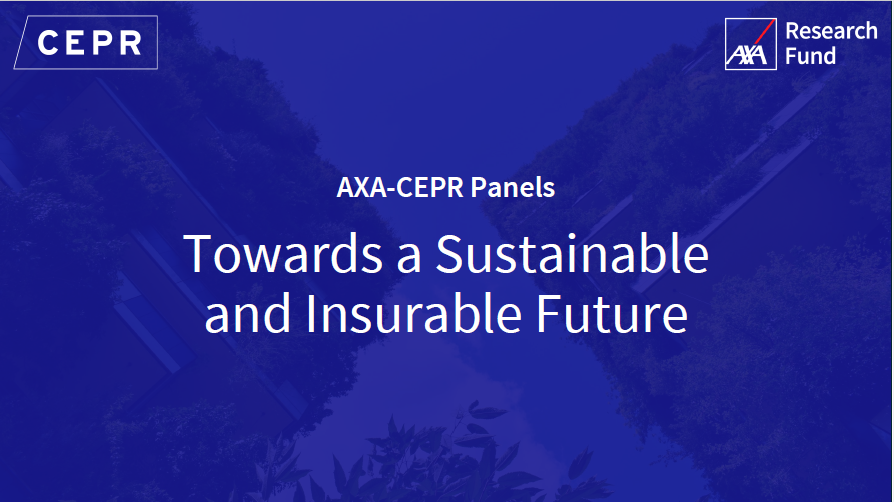“Towards a sustainable and insurable Future” was the central topic of the climate- economics conference that was co-organized by @AXA Research Fund and the CEPR - Centre for Economic Policy Research on September 11th 2024 at Collège de France.
High level stakeholders from academia, policy making, and the industry delved into discussing insurability of the world of tomorrow and the role of public and private climate finance in transitioning to a sustainable economy.
The first panel featuring, Thierry Langreney, Betrand Villeneuve, Achim Wambach, Pamela Schuermans and Mathieu Godart revolved around the role of insurance in addressing the growing frequency of weather-related disasters and the needed adequate insurance coverage. Some key facts that emerged from the discussion include the significant increase in natural catastrophe claims over the years, with economic losses rising from about 30 to 50 billion euros per year in the early 90s to around 200 billion euros per year by the end of the 2020s. Additionally, current European insurance protection gap currently stands at 75% - meaning that only a quarter of losses are insured, and in some member states, this figure can be as low as 5%, leading to pressure on European Unition member states.
In this context the panel a highlighted the need for solidarity and acceptance for increased with increasing damage, improve customer management to help people as fast and as best possible and the need to have supply chain of those people and businesses ready that can help rebuild houses and repair cars. There is also work to do with regards to information especially for SMEs, as many are not aware of the climate risks they are facing. The panel discussion also revealed divergent opinions on liberal versus non-liberal aspects of the insurance market and the role of public versus private insurance. These differing perspectives underscored the complexity of the challenges and the need for a balanced and collaborative approach to address these issues effectively.
Based on the panel discussion, several recommendations can be drawn to address the challenges and issues identified:
· Investment in Prevention: Collaboration between governments, insurers, and individuals is crucial to implement collective and individual prevention measures, reducing risks and minimizing damages from natural disasters, notably for SMEs.
· Fair Insurance Premiums: Balancing affordability with accurate risk coverage is essential for the sustainability of the insurance market.
· Public-Private Partnerships: Collaborative efforts between the public and private sectors are vital in addressing the increasing demands and challenges in the insurance landscape. These partnerships can enhance risk management and improve insurance coverage through shared knowledge, data, and resources.
· Extending Coverage: Consideration should be given to mandatory insurance for certain risks and measures to ensure universal coverage, particularly in high-risk areas. This approach can spread the risk effectively and protect vulnerable populations.
· Efficient Risk Management: Efforts are needed to promote efficient risk management practices, including incentivizing prevention measures through impact underwriting and implementing relevant risk insurance premiums to discourage building in high-risk areas.
· Vulnerable Communities: Tailored solutions and support mechanisms must be developed to address the unique insurance needs and challenges.
The second half of our afternoon's panel discussion focused on the pressing need to finance the transition to a sustainable economy. Esteemed experts, including Katheline Schubert, Gilles Moec, Maud Abdelli, and Olivier Rousseau, shed light on the significant investment required to achieve a net-zero economy. Current estimates indicate an annual investment need of around 406 billion euros per year, or 2.6% of GDP per year to achieve EU 2030 targets. The panel emphasized the pivotal role of the private sector in shouldering a significant portion of the necessary investment, especially in Europe, given the constrained fiscal room for maneuver in the public sector. They underscored the importance of clear and stable policies for carbon pricing and to provide the private sector with the necessary visibility and certainty for making long-term sustainable investment decisions. The discussion also brought attention to the interconnectedness of climate change and nature conservation, emphasizing the need for significant investment in nature-related targets alongside climate change. The panel highlighted the complexities and nuances of financing the transition to a sustainable economy, emphasizing the need for concerted efforts from both public and private sectors to achieve the ambitious objectives of a net-zero economy.
Based on these points, a couple of recommendations for moving forward could include:
· Establishing clear and stable policies for carbon pricing and sustainability to provide the private sector with the necessary visibility and certainty for making long-term sustainable investment decisions.
· Encouraging international collaboration and coordination, particularly in leveraging public bodies and international forums to address the funding gap for sustainable investments in developing countries.
Resources:
You can watch the conferences videos in replay via this link and to go further, you can listen to the podcasts below:
“Insuring the world of the future” with Mathieu Godart (Directeur Général AXA IARD & Partenariats at AXA France) and Thierry Langreney (Chariman at Les Ateliers du Futur) , interviewed by Tim Phillips, accessible via this link
“Financing the green transition” with Gilles Moëc (AXA Group Chied Economist) and Katheline Schubert (Professor of Economics Pantheon-Sorbonne University; Associate Chair Paris School of Economics (PSE)) interviewed by Tim Phillips, accessible via this link
“ The price of deforestation” with Jose A. Scheinkman (Charles and Lynn Zhang Professor of Economics Columbia University; Research Associate National Bureau Of Economic Research (NBER); Theodore Wells '29 Professor of Economics (Emeritus) Princeton University), interviewed by Tim Phillips



